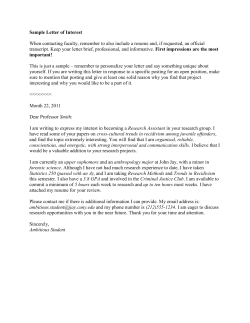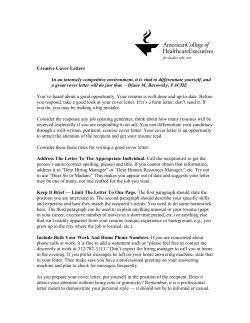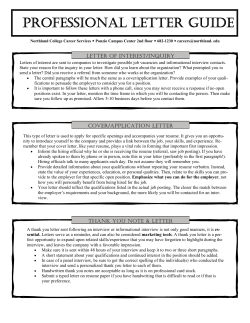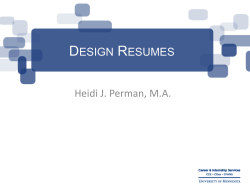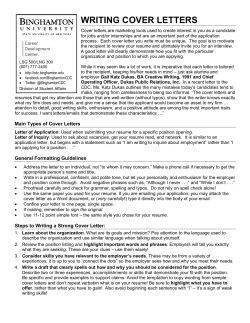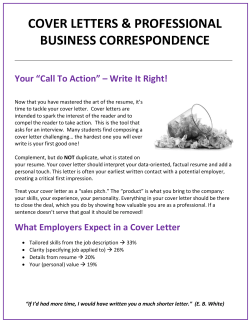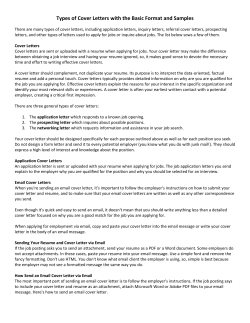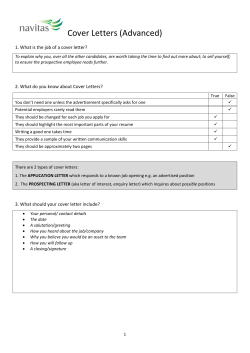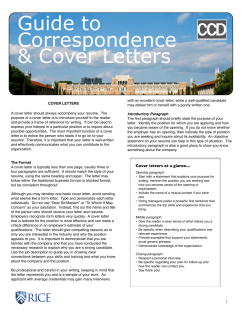
Resume and Letter Writing Guide 2012 -... Table of Contents
Resume and Letter Writing Guide 2012 - 2013 Table of Contents 2 6 7 10 11 12 13 14 Writing Your Resume Sample Resume Resume Action Words Writing Cover Letters Sample Cover Letter Sample Prospecting Letter Sample Thank You Letter Professional References Career Development Services Florida Gulf Coast University 10501 FGCU Blvd S. Fort Myers, FL 33965-6565 (239) 590-7946 Email: careercenter@fgcu.edu Website: http://studentservices.fgcu.edu/careers/ FGCU Career Development Services supports the mission of the University and the Division of Student Affairs by promoting student learning and development and helping students fulfill their career expectations. Within this context, we assist students in developing and implementing career, education, and employment plans and decisions. Overview of Services Job and internship search advising, including resume/cover letter assistance and preparation for employment interviews and salary negotiation. Graduate school planning, including assistance with resume/CV/personal statements, graduate school research, and preparation for interviews. Advising on career and major selection, including assessments, major and career information, and assistance in the decisionmaking process. Campus student employment, through the use of a web-based job listing system, College Central Network. Resume and Letter Writing Guide – FGCU Career Development Services Page 1 Writing Your Resume Your Step-By-Step Resume Building Guide IMPORTANT NOTE: While there is not necessarily one “right” way to write a resume, FGCU Career Services attempted, through this guide, to capture many of the preferences employers have expressed to us about resumes. This guide is particularly helpful if you have never created a professional resume before. However, even if you already have one, we strongly encourage you to review the guide and compare it to your current resume. What is a resume and why is it important? A resume is a document that summarizes your professional qualifications. When a recruiter sees your resume, it will be the “first impression” they have of you. They will use your resume to see whether you are a good “fit” for the position, and how well you compare with other candidates. The bottom line? It is critical that your resume has the right look and content to get you noticed. A well-written resume can improve your chances of being considered for an interview. STEP 1: Developing Your Content - “Make a List” The two main elements of a resume are content and design. The content phase is first. Start by assembling all the information about your qualifications. Open a Word document and make a list of your experiences using the guide below: Education - Include the following: o Start with “Florida Gulf Coast University” and o o o o o o follow with the names of other universities or community colleges you attended The name of the degree you are pursuing and when you expect to graduate (example: “May 2015”) Any minors or concentrations Any academic recognitions, such as Dean’s List or Honor Society Your GPA if it higher than a 3.3 Any study abroad experiences For those students with no related work experience, consider including a listing of coursework within your major or any major projects that are highly related to the field you are pursuing. Generally speaking, do not include high school on our resume. Exception: Since Freshman and sophomores sometimes don’t have much work experience, they can include high school in their “Education” section and high school activities such as clubs, sports, student government, etc. However, remove high school information when you start your junior year, unless it is directly related to your career goal. Employment: While making this list, it is best to include every job you have ever had. You can refine this list later. Start with your current or most recent job and list them in reverse-chronological order. State the name of the employer, city, state, position(s) held, and dates of employment (month and year.) DO NOT include the name and contact information for your supervisor. Internships or Field Experiences: Record in the same format as your work experience. Extracurricular Activities, especially leadership: For example: membership in student clubs, fraternity/sorority, Student Government, etc. Volunteer and Community Service: Your Service Learning hours are perfect for this section! Honors, Awards and Memberships in Professional Associations (if any) Related Skills: Not everyone has this section. If you do, the skills should be specific like web design skills or second languages, as opposed to “organizational skills.” Resume and Letter Writing Guide – FGCU Career Development Services Page 2 STEP 2: Enhance Your Content – “Marketing You!” Now it is time to build descriptions into your jobs and internships (and extracurricular activities, if applicable.) During this part, it may be helpful to ask yourself some questions about each of the experiences: What did you do? How did you do it? How well did you do it? What skills did you use to do it? Why did you do it? How much and how many? The goal is not to have the details of your previous positions sound like a “job description.” Job descriptions describe a position– employers want to know about YOU! Use the checklist below to help with this process: Action-oriented – This is very important. Each sentence should begin with an “action” verb, such as coordinated, collected, planned, maintained, promoted, prepared, provided, merchandised, or managed. Refer to the “Actions Verbs” section of the guide. Accomplishment-based – Were you ever recognized as employee of the month? Did you exceed your sales goals? Were you ever given additional responsibilities like training new staff? Measurable – If you supervised employees, how many? If you were in sales, what were your sales in $ amounts. Quantify wherever possible. Detailed – For example, if you planned events, describe what the events were and what was involved in the planning. Don’t expect the recruiter to figure out what you did. Tell them! Industry verbiage – If you are pursuing a career in a particular field, your resume should contain words common in that industry (e.g. For a marketing position, terms such as brand management, consumer behavior, marketing mix, consumer research, product development, campaign management should appear on the resume, either through your work experience (preferably) or education. Quick Tips: Current jobs are written in the present tense (“coordinate”), past jobs in the past tense (“coordinated”) Do not refer to yourself by using the word “I.” It is understood the resume is about you. For very basic jobs or jobs in which the nature of work is evident by the job name (cashier, server, delivery truck driver, landscaper) do not go into great detail. STEP 3: Organize Your Content – “From the Top Down” Did you know that recruiters may only spend about 30 seconds scanning your resume the first time they read it? Therefore, you need to capture their attention right off the bat. The order of the categories on your resume should be arranged with the most relevant and marketable information on top. This is typically your education and related work experiences. √ If you have related work experience, separate your work experience as “Related Work Experience” and “Other Work Experience.” List “Related” work experience before “Other” work experience. √ Within each section (Related or Other), list your experience in reverse chronological order, meaning your most recent jobs should be at the top. Include month and year. Be consistent for all jobs you list. √ For summer or holiday jobs use “Seasonal” to cover multiple years (e.g. Seasonal 2008-2010) √ If some of your related experience was unpaid, such as through an internship or volunteer positions, drop the word “Work” from the title and call it “Related Experience.” Resume and Letter writing Guide – FGCU Career Development Services Page 3 √ In most cases, it is a good idea to list all or most of your work experiences, even if they are unrelated. Those jobs reflect positively on your work ethic and responsibility. Most employers do not want to hire someone that hasn’t worked before, so if jobs aren’t on your resume, they can’t assume anything about your past work experience. Identifying Your Transferable Skills Another benefit of including some of your unrelated work experiences is that they allow you to communicate your transferable skills. Your goal is to demonstrate how your previous experience TRANSFERS to the position you are seeking. Do the best you can. While it is true more experienced workers typically have more to say—students sometimes undersell themselves if they do not spend time thinking about this critical area. Job or Experience Administrative Assistant Committee Member for Special Event Public Relations Intern Retail Associate Sports Team Captain Restaurant Server Creative Writing Club Member Dance Club President Childcare Provider (babysitter) Sorority Member Marching Band Member Transferable Skills to Highlight scheduled and coordinated team meetings, coordinated multiple projects simultaneously, developed divisional reports on a monthly basis worked in a team environment, achieved fundraising goal of $1,000 developed and distributed press releases, researched social media presented merchandise, resolved customer problems, awarded “Associate of the Month” 3 times maintain personal discipline, motivate team of 25 Members, set and obtained team goal ensured customer satisfaction, multi-tasked under pressure, presented new menus to team every month wrote and edited a variety of articles and essays, designed and proofed quarterly student publication organized and lead weekly rehearsals, promoted club through group presentations to local high school audiences of 100+ planned activities, tutored on reading skills for 3 children ages 3-5 years oriented new members, followed and Implemented organization guidelines for 40 members scheduled daily, weekly and monthly rehearsals, organized instrument transportation and insurance What about an “Objective”? In most cases, an objective is not needed since you will typically include what your objective is in your cover letter. An objective should only be used when it is highly specific. For example: “To obtain a position in pharmaceutical sales.” It may also be helpful when posting your resume on a job boards so that prospective employers know what kind of job you are seeking. STEP 4: Design Your Resume – “Keep It Simple” As we stated before, the first time a recruiter looks at your resume, he/she may scan it quickly. This means you need to present your credentials in an easy-to-read format. Start with a Simple Word Document. Do not build your resume in a template. Most recruiters do not like template resumes. Why? • Templated resumes don’t usually display the information the way recruiters like to read them. • It may convey to the recruiter that you are not proficient in Word or don’t know how to write a resume. This may be perceived as unprofessional and unsophisticated. • Templates can be difficult to modify and make changes in. Resume and Letter Writing Guide – FGCU Career Development Services Page 4 We suggest you consider using the design guidelines: • Use a common font (e.g. Times New Roman, Calibri or Arial) throughout the entire resume • Make your section headings are distinct by using text treatments (like bolding, CAPS, and italics) • Use bullet points to for lists (like when describe your responsibilities in a position you held) • Margins should be 1” at most and content should fill the page • Text size should be no smaller than 11pt. Keep same font size throughout the resume (your name can be larger) • In most cases, and especially for recent graduates, your resume should not be longer than one page! (Although there are some exceptions, such as resumes in the field of education, or workers DO NOT STATE ANY OF THIS with over 15 years of experience.) INFORMATION ON YOUR • Do not list your references! Create a separate document for that. RESUME: It’s also not necessary to include “References Available Upon Age, gender, ethnicity, race, Request”. Typically references are only requested by employers later in the hiring process. marital status, family situation STEP 5: Review, Revise and Proof Your Resume No spelling or grammatical errors. For highly competitive positions, a mistake on your resume may preclude you from further consideration . Proof your resume several times. Have a friend or roommate proof it too. Do not rely on “spellcheck.” STEP 6: Managing Your Resume Document –“Which Format When?” (number of children), Social Security Number, University Identification Number (UIN), and photos of yourself. In most cases, hobbies and interests are not included either, unless they related DIRECTLY to the position you are pursuing. The resumes of potential candidates find their way to recruiters in many ways. Some recruiters may search online job sites like College Central Network or Monster.com. You might submit your resume as an attached email document or upload it to a company website. You may even deliver it directly into the hands of potential employers at a career fair or networking event. In all cases, it is important to select the correct file format. Sending a resume via email: The preferred file format is a PDF attachment. Cover letters should be included in the body of your email and/or attached separately. Name your files professionally (e.g. PatSymthResume or PatSymthCoverLetter). Presenting a resume in person: In this case, file format is not as important as the quality of the printing and paper. Consider using a heavier paper stock and be sure the print quality is clear. Resume quality directly reflects upon your professionalism. The campus bookstore sells resume paper. Uploading a text-based version of your resume (Also known ASCII or Scannable resume): You may need to save your resume as a “Plain Text” file. Large corporations often use a scanning process to review and track resume submissions. While this resume format is not necessarily attractive, the use of plain text and key words can help your resume be identified by databases. Resume and Letter Writing Guide – FGCU Career Development Services Page 5 SAMPLE RESUME OVERALL DESIGN NO TEMPLATES. NO TEXT BOXES. NO GRAPHICS. NO UNUSUAL FONTS. ONE PAGE DOCUMENT WITH 11 OR 12 SIZE FONT. DO NOT LIST REFERENCES. IN TERMS OF “SUMMARY STATEMENTS” OR”OBJECTIVES” TYPICALLY WE DO NOT RECOMMEND THEM SINCE THE COVER LETTER IS A GOOD PLACE TO DISCUSS YOUR SPECIFIC 100 North 20th Street – Fort Myers, FL 34567 CAREER GOALS. HOWEVER, (239) 000-000 – psmythe@eagle.fgcu.edu EXPERIENCED JOB SEEKERS MAY ______________________________________________________________________________________ HAVE A “SUMMARY OF QUALIFCATIONS.” PAT A. SMYTHE EDUCATION Florida Gulf Coast University, Fort Myers, FL Pursuing a Bachelor of Arts Degree in Communication Expected May 20XX • 3.4 Cumulative GPA; Dean’s List 20XX • Relevant coursework: Advanced Public Speaking, Journalism, Organizational Communication Behavior, Communication and Conflict, and Nonprofit Public Relations University of Florida, Gainesville, FL Completed 30 hours of general education coursework EDUCATION LIST THE DEGREE20XX YOU ARE CURRENTLY August – May 20XX PURSUING. ACCEPTABLE TO LIST COURSEWORK IN MAJOR. INCLUDE GPA IF 3.3 OR BETTER. INCLUDE DEAN’S LIST OR OTHER ACADEMIC AWARDS. RELATED EXPERIENCE Gulf Coast Cruise Liner, Naples, FL Community Relations Intern / Newsletter Editor August 20XX– December 20XX • Drafted and distributed 10 press releases to print media about company’s work with local charities • Developed a list of 20 contacts at local radio and television stations for event coverage • Represented the company at monthly Chamber ACTION VERBS of Commerce events and trade shows DON’T JUST LIST RESPONSIBILITIES. • Created quarterly company newsletter which was distributed to all customers QUANTIFY WITH NUMBERS, DATES OR • Coordinated speaking arrangementsPERCENTAGES. for company President on boating safety START EACH SENTENCE WITH AN • Constructed 5 PowerPoint presentations for sales meetings ACTION VERB. • Revamped content of company website to better showcase product line • Designed graphics layout for new company brochures and created advertising literature to distribute to upscale residential communities • Researched competitors to identify gaps in the marketplace and suggest sales opportunities, which helped increase revenues by over 8% from the previous year CHRONOLOGICAL ORDER RELATED SKILLS START WITH MOST RECENT JOB • Proficient in a variety of business computer applications, including Excel, Access, Publisher, Flash, LIST MONTH AND YEAR USE “SEASONAL” FOR SUMMER OR Dreamweaver, InDesign, and Photoshop PART TIME HOLIDAY JOBS • Bilingual – conversational Spanish OTHER WORK EXPERIENCE The Beachside Restaurant, Server, Fort Myers, FL December 20XX – Present LIST “RELATED SKILLS” IF YOU HAVE • Selected as February Employee ofTHEM the Month for providing outstanding customer service – NOT EVERYONE DOES. MUST BE SPECIFIC SKILLS YOU HAVE • Provide orientation and on-going training to new hires EXTRACURRICULAR TRAINING OR EXPERIENCE IN ACTIVITIES UniversityROLES Bookstore, Sales Associate, Gainesville, FL August 20XX – May 20XX LIST LEADERSHIP SUCH AS •COMMIITEE Assisted the Community Relations Manager in hosting author book signings and special events CHAIR OR VICE • Volunteered to be cross-trained in all other areas of the store in order to provide additional support and PRESIDENT. assistance to those departments as needed DO NOT LIST HOBBIES OR PERSONAL INTERESTS Collier County Parks & Recreation, Summer Camp Counselor, Naples, FL Seasonally (20XX – 20XX) CAMPUS AND COMMUNITY INVOLVEMENT • Florida Gulf Coast University Student Government – Public Relations Committee • Habitat for Humanity, Volunteer Coordinator-Developed schedule and organized reception table Resume and Letter Writing Guide – FGCU Career Development Services Page 6 Resume Action Words Administrative & Management Skills Administered Advised Analyzed Approved Assigned Authorized Chaired Consolidated Contracted Controlled Coordinated Counseled Delegated Determined Developed Diagnosed Directed Disseminated Enforced Ensured Examined Executed Explained Governed Guided Hired Implemented Influenced Initiated Inspired Installed Instituted Instructed Integrated Launched Lectured Managed Mentored Moderated Monitored Motivated Negotiated Organized Originated Oversaw Performed Pioneered Planned Presided Prioritized Processed Produced Promoted Recommended Redirected Referred Reorganized Represented Responded Reviewed Routed Scheduled Sponsored Streamlined Strengthened Supervised Taught Terminated Trained Validated Innovated Integrated Interpreted Interviewed Introduced Invented Launched Lectured Led Manipulated Mediated Merged Modernized Motivated Negotiated Obtained Painted Validated Perceived Performed Persuaded Planned Presented Produced Projected Proofread Publicized Published Read Realized Reasoned Reconciled Recruited Rectified Remodeled Reported Revitalized Scheduled Screened Shaped Sold Spoke Stimulated Summarized Synthesized Taught Trained Translated Visualized Wrote Communication and Creativity Skills Abstracted Acted Addressed Arbitrated Arranged Assessed Authored Briefed Built Clarified Composed Conceptualized Conducted Constructed Corresponded Costumed Created Systematized Critiqued Demonstrated Designed Developed Developed Directed Edited Enabled Enlisted Facilitated Fashioned Formulated Generated Helped Imagined Influenced Initiated Tabulated Financial Skills Adjusted Administered Allocated Analyzed Appraised Audited Balanced Bought Budgeted Calculated Computed Conciliated Decreased Detailed Developed Disbursed Dispensed Distributed Doubled Downsized Economized Eliminated Exceeded Financed Forecast Funded Gained Generated Increased Invested Maintained Managed Marketed Merchandised Planned Projected Purchased Reconciled Reduced Reported Resume and Letter Writing Guide – FGCU Career Development Services Researched Reshaped Retailed Saved Secured Sold Solicited Sourced Specified Supplemented Page 7 Helping Skills Adjusted Advanced Advised Aided Arbitrated Assisted Attended Augmented Backed Balanced Boosted Braced Cared Clarified Collaborated Comforted Consoled Consulted Contributed Counseled Demonstrated Developed Diagnosed Directed Encouraged Expedited Facilitated Familiarized Fostered Furthered Guided Helped Instilled Led Liaised Listened Mentored Ministered Negotiated Nourished Nursed Nurtured Obliged Promoted Provided Reassured Reclaimed Rectified Redeemed Reeducated Referred Reformed Rehabilitated Related Rendered Repaired Represented Served Serviced Settled Spoke Stabilized Streamlined Supplied Supported Translated Treated Tutored Unified Research Skills Administered Amplified Analyzed Applied Articulated Assessed Audited Augmented Balanced Calculated Charted Clarified Collected Compared Compiled Composed Concentrated Conducted Constructed Consulted Critiqued Decided Detected Determined Diagnosed Discovered Documented Drafted Edited Evaluated Examined Exhibited Experimented Explored Extracted Extrapolated Focused Forecast Found Gathered Generated Identified Integrated Interpreted Interviewed Invented Investigated Located Measured Observed Obtained Organized Perceived Pinpointed Planned Prepared Processed Proofread Recognized problems Researched Reviewed Riveted Screened Studied Summarized Surveyed Synthesized Systematized Unearthed Wrote Produced Promoted Proposed Publicized Purchased Realized Recruited Reduced Reported Researched Resolved Restored Reviewed Routed Saved Served Set goals Sold Solved Stimulated Summarized Surveyed Translated Sales Skills Arbitrated Catalogued Centralized Consulted Dissuaded Documented Educated Established Expedited Familiarized Identified Implemented Improved Increased Influenced Inspired Installed Integrated Interpreted Investigated Judged Launched Lectured Led Liaised Maintained Manipulated Marketed Mediated Moderated Negotiated Obtained Ordered Performed Planned Processed Resume and Letter Writing Guide – FGCU Career Development Services Page 8 Teaching skills Acquainted Adapted Adopted Advised Answered Apprised Augmented Briefed Built Certified Charted Clarified Coached Collaborated Communicated Conducted Coordinated Counseled Decided Delegated Delivered Demonstrated Designed Developed Directed Dispensed Distributed Educated Effected Empowered Enabled Enacted Encouraged Enlarged Enlightened Expanded Explained Facilitated Fomented Formulated Generated Grouped Guided Harmonized Implemented Influenced Informed Initiated Innovated Installed Instituted Instructed Integrated Invented Lectured Listened Originated Persuaded Presented Responded Revolutionized Set goals Stimulated Summarized Trained Translated Valued Developed Devised Drafted Edited Educated Eliminated Excelled Expanded Expedited Fabricated Facilitated Forecast Formed Generated Improved Increased Inspected Installed Instituted Integrated Interfaced Launched Lectured Maintained Marketed Mastered Modified Molded Operated Packaged Pioneered Prepared Processed Programmed Published Reconstructed Reduced Researched Restored Revamped Streamlined Supplemented Surveyed Systematized Trained Upgraded Wrote Technical Skills Analyzed Broadened Charted Classified Communicated Compiled Computed Conceived Conducted Coordinated Designed Detected Resume and Letter writing Guide – FGCU Career Development Services Page 9 Writing Cover Letters Any time you email, fax, mail, or submit your resume online, you should include a cover letter. The purpose of a cover letter is to show the prospective employer how your qualifications fit the particular job you are applying to, as well as to communicate your interest in working for that particular organization. There are two basic types of cover letters: letters of application and letters of inquiry (or prospecting letters.) A letter of application is used when applying for a position that has been posted and is currently available. The letter should clearly state how your educations, skills, and experience match the qualifications listed in the job posting. Therefore, it is imperative that you closely examine the job posting and ensure your letter addresses at least three of the main qualifications desired. Do not, however, duplicate everything that is on your resume just highlight your main qualifications. Also, you should never use a “generic” cover letter. Each one should be customized for a specific job and company. A letter of inquiry, or prospecting letter, is sent to express interest in working for a particular employer when there is not an advertised job posting to respond to. In this type of letter, summarize your qualifications and highlight how you can make a contribution to the company. You also must communicate why this company interests you and why you want to work for them. Therefore, like a letter of application, these letters should be customized for a specific company – never use a generic letter. These types of letters are most effective when you can reference how you heard about the company, whether it is through one of your contacts or through your research. However, not all employers accept unsolicited letters and resumes. In most cases, cover letters should not exceed one page in length. Use a professional business format, such as full block style. Below are the main sections to include when composing a cover letter. Key Sections: Salutation – Your letter should be addressed to a specific person. Research the most appropriate person to receive the letter. Consider calling the company receptionist for the name of the department manager. First Paragraph – State immediately and concisely which position you are applying for and how you heard about it. Keep the first paragraph short – in most cases no more than 2 – 3 sentences. Second Paragraph – This is your “sales pitch.” What makes you the best candidate for the position? Refer to the job posting, and correlate how your education, skills, and experience match the needs of the position. But don’t just repeat your resume. Pick 4 -5 key areas where you are a good fit. Optional Third Paragraph – Why do you want to work for this employer? Emphasize your knowledge about the company, your familiarity with the industry, and how this position fits into your career plans. If this section is not longer than two sentences, do not create a third paragraph – just combine content into the final paragraph. Final Paragraph – In this paragraph, thank the person for their time and consideration. Indicate the phone number where you can best be reached. (Make sure there is a professional greeting, including your name, on your voicemail message!) If you are applying to a position out of the area, indicate when you are planning to relocate to that area, or when you may be taking a trip to that area and would be available for an interview. The Closing – Keep the closing simple-“Sincerely” suffices. If sending the letter via email, simply type your name under your closing. (You can include a script version of your name in place of a signature.) If printing your letter, sign your name in blue or black ink above your typed name. Resume and Letter Writing Guide – FGCU Career Development Services Page 10 Sample Cover Letter PAT A. SMYTHE 100 North 20th Street – Fort Myers, FL, 33901 (239) 000-0000 – psmythe@eagle.fgcu.edu August 25, 20XX Peter Jones General Manager Neapolitan Marine Inc. 1000 Commerce Lane Naples, FL 33979 Dear Mr. Jones: Please accept this letter and resume in application for the Public Relations Director position at Neapolitan Marine (#1234) as posted on the FGCU College Central Network website. I believe my combination of experience, skills and personal interest in the boating industry may match well with the qualifications you are seeking. On my resume you’ll note that I recently graduated from Florida Gulf Coast University with a Bachelor of Science Degree in Marketing. This past spring, I served as the Public Relations/Advertising Intern at Gulf Coast Cruise Liner, a luxury yacht broker in Naples where I had the opportunity to work with the media, write press releases, and develop community relations events. My responsibilities also included overseeing the creation of all corporate marketing materials and maintaining the company website. Managing these communication strategies required proficiency in various desktop publishing programs and website design software. Attention to detail, strong organizational skills, and the ability to work under deadlines were critical to ensuring successful public relations efforts for the company. Neapolitan Marine has a great reputation in the boating industry and I am very interested in learning more about this position and your public relations goals. I would welcome the opportunity to speak with you in more detail about my background and how I may be able to contribute to your team. Feel free to contact me at your convenience at 239-000-0000. Thank you for your time and consideration. Sincerely, Pat A. Smythe Pat A. Smythe Resume and Letter Writing Guide – FGCU Career Development Services Page 11 Sample Prospecting Letter PAT A. SMYTHE 100 North 20th Street – Fort Myers, FL 33901 (239) 000-0000 – psmythe@eagle.fgcu.edu September 12, 20XX Peter Jones Director of Business Development ACE Advertising 1000 Commerce Lane Tampa, FL 33979 Dear Mr. Jones: I am a recent graduate of Florida Gulf Coast University with a Marketing degree and am considering relocating to the Tampa area. While conducting research on advertising firms in Tampa, I came across your company website and was very impressed. I have been looking for opportunities to break into the advertising field and would like to inquire about possible positions in your account management department. As indicated on my resume, I have gained advertising experience through an internship at the Gulf Coast Chamber of Commerce, which involved working on numerous outreach initiatives with the Membership Director. These projects included creating promotional materials, developing media spots, redesigning the website, and assisting with a direct mail campaign. I also noticed on your website that your company has accounts with many of the top luxury resorts in Florida. As an Assistant Front Desk Manager at an upscale hotel in Naples for two years, I have a strong understanding of the hospitality industry, which may enable me to make an immediate contribution with some of these accounts. I am genuinely interested in working for ACE Advertising. If there aren’t any full-time positions available, I would also be willing to work part-time or assist on a temporary basis with any special projects you may have. I would welcome the opportunity to discuss this in more detail with you. Feel free to contact me at your convenience at (239) 000-0000. Thank you for your time and consideration. Sincerely, Pat A. Smythe Pat A. Smythe Resume and Letter Writing Guide – FGCU Career Development Services Page 12 Sample Thank You Letter PAT A. SMYTHE 100 North 20th Street – Fort Myers, FL 33901 (239) 000-0000 – psmythe@eagle.fgcu.edu September 19, 20XX Mr. Peter Jones General Manager Neapolitan Marine, Inc. Naples, FL 33979 Dear Mr. Jones: I would like to thank you for the opportunity to interview for the Marketing Director position at Neapolitan Marine. During the interview, you stressed that having a strong marketing program was critical to achieving your goal of becoming the largest marine products supplier in Southwest Florida. With my previous marketing experience and connections in the local boating industry, I believe I can help you achieve your goal. I am very interested in joining your leadership your team and contributing to the continued success of Neapolitan Marine. I look forward to hearing from you and appreciate your consideration of my candidacy for this position. Sincerely, Pat Smythe Pat Smythe Resume and Letter Writing Guide – FGCU Career Development Services Page 13 Professional References Since over 80% of employers check references, be prepared to submit a list of your professional references to prospective employers. Do not put your references on your resume – they should be on a separate document, titled “Professional References.” In most cases, only submit your reference with your resume if it is requested. Also, it is not necessary to write “References Available upon Request” on your resume. That is understood. Why do employers conduct reference checks? Ensure the consistency of everything stated on your resume and what you have said in the interview Obtain feedback that provides a more in-depth picture of you as a candidate, including their perception of your skills, personality, and work performance Identify any areas of weakness or concern Consequently, these are the only individuals capable of providing this information objectively: Current and former supervisors and colleagues (supervisors preferred) Current and former faculty/staff members People that may know you from a substantial volunteer experience. As you can see, friends and relatives are not included on the list since they probably can’t speak to your employment performance, and their feedback is not typically considered objective. Follow the sample reference entry below: Mr. John Smith Teller Supervisor Everglades Bank 100 Main St. Fort Myers, FL 33988 Cell: (xxx)xxx-xxxx Work: (xxx) xxx-xxxx Email: jsmith@eb.com Relationship: Immediate supervisor for two years at Everglades bank Preparing your list of references: Your list should compromise a minim of three, maximum of five references Ask each person if they would be willing to serve as your reference, and be sure they will give you a positive reference. If a person doesn’t seem pleased about being a reference, you are probably better not using them. A lukewarm or “I don’t know her very well” reference can be damaging. Ask them for the phone number in which they prefer to be contacted If you know, let them know what kinds of jobs or which companies you are applying to. This can help them customize their feedback toward the job/company. Put them in order of strongest to weakest. Your strongest references are typically your current supervisor, individuals who know you well and have the most favorable things to say about you, and people that have know you the longest. Avoid having more than two references from the same place. Bring a hard copy on stationary that matches your resume when you go on an interview. Once you have obtained the job, it is professional protocol to send a note or email to all your references letting them know, and thanking them for their help. Resume and Letter Writing Guide – FGCU Career Development Services Page 14
© Copyright 2025
